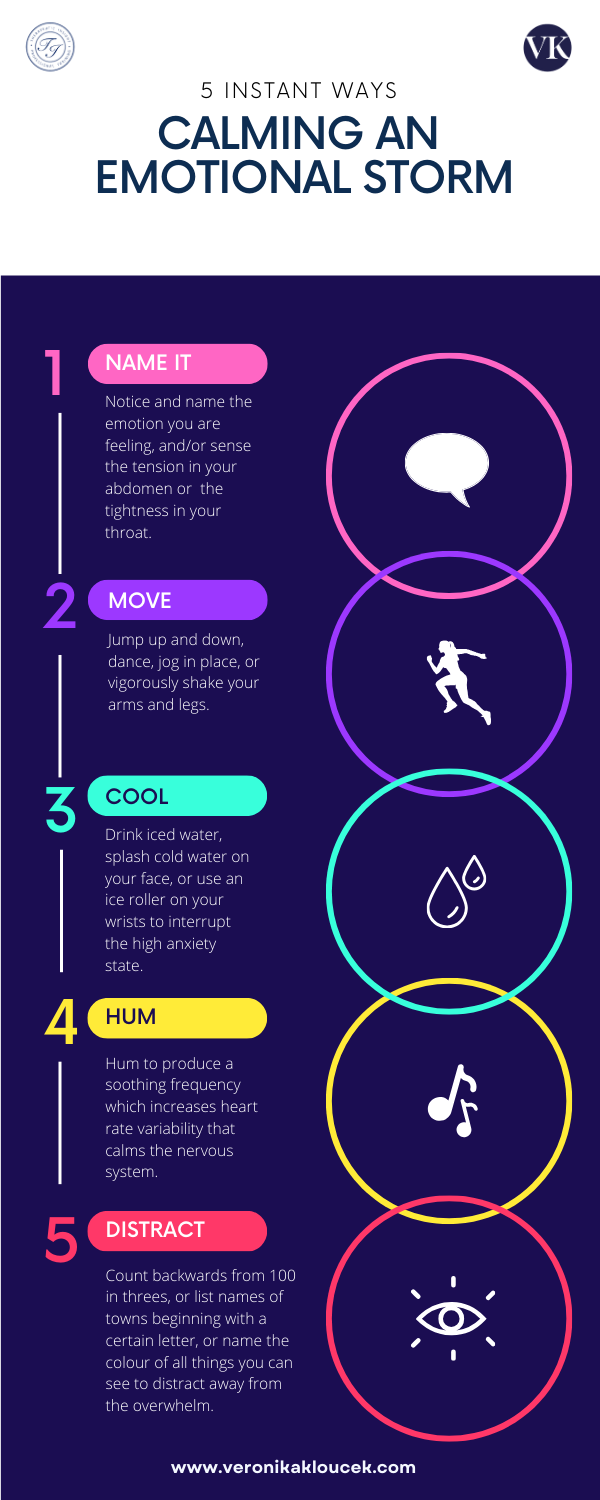
5 Instant Ways To Calm Down
by Veronika | Oct 22, 2023
Clients often ask me how to calm down overwhelm and deal with a frantic mind.
What you can do in the moment to regain control in a tense, high anxiety state is different from learning techniques to better manage your stress long-term. The latter will enable you to become emotionally more flexible and resilient so that you are better equipped to deal with stressful situations.
Some good longer term stress management skills to build over time are carving out ‘me’ time, taking a walk, practicing mindfulness or yoga, and practicing abdominal or diaphragmatic breathing techniques.
How to snap out of an emotional storm?
Something pushed you over the edge. You are feeling upset, or angry, or frightened to be rejected again. Maybe your boss just brought the deadline forward, or your spouse rubbed you the wrong way, or your kids are screaming at each other again. Maybe regretful thoughts over a painful breakup have taken over, or you are obsessing over who to invite to your upcoming birthday party… Whatever it is, you need to snap out of it right now!
In a high anxiety state of dysregulation your nervous system has entered the sympathetic “fight or flight” mode, which makes it hard to think straight.
Here are five instant techniques that can switch your body’s parasympathetic “rest and digest” mode back on helping you to calm down when you feel on edge. Not all these ways will resonate and work for everyone all the time. Different methods may work at different times.
 1. ‘Name it to tame it’ says Dr. Dan Siegel referring to the importance of labelling the accurate emotion that you are feeling which will allow you to process it properly. The trick is to really stay with it without needing the emotion to change immediately. You can use your physical sensations as a start. For example, noticing and sensing into the tension in the abdomen or into the tightness in the throat.
1. ‘Name it to tame it’ says Dr. Dan Siegel referring to the importance of labelling the accurate emotion that you are feeling which will allow you to process it properly. The trick is to really stay with it without needing the emotion to change immediately. You can use your physical sensations as a start. For example, noticing and sensing into the tension in the abdomen or into the tightness in the throat.
2. Move to complete the “fight or flight” reaction. For example, jumping up and down, dancing, jogging in place, or vigorously shaking arms and legs, will let the nervous system know that the “fight or flight” cycle is completed, and it can switch on the “rest and digest” mode.
3. Use cold water or ice snap you out. Cold stimulates the activation of the vagus nerve, which controls the parasympathetic branch that is responsible for “rest and digest”. Drinking iced water, splashing cold water on the face, or using an ice roller on your wrists can interrupt the high anxiety state, research suggests.
4. Humming stimulates the Vagus nerve. As yogis might know from experience and studies indicate, humming or om-ing produces a soothing frequency inside the embodied mind which increases heart rate variability thereby calming the nervous system.
5. A distraction technique redirects your mind towards any simple activity and away from your current upsetting emotions. For example, count (e.g. count backwards from 100 in threes, or count tiles on a floor), or list names of towns beginning with a certain letter, or name the colour of all things you can see.
I haven’t yet mentioned breathing. Clients often roll their eyes with frustration when I mention the breath reporting that it just hasn’t helped at all whenever they tried taking a few deep breaths to relax. Indeed, just taking a few breaths that might not even be at a slower than normal breathing pace, will certainly not whether an emotional storm.
Understanding the basic principles of how the breath works on the nervous system is essential in successfully using the breath to regulate emotions and taking back control. So whilst it is a very powerful technique, it takes a little practice to be able to apply it when you need it.
You can read this article to learn more about diaphragmatic breathing »
If this article resonates with you and you would like to find out more for yourself or your organisation about how we can help you increase your stress resilience and help prevent burnout, schedule a confidential enquiry call today!
Veronika Kloucek, Senior Psychotherapist, Trainer, Coach

